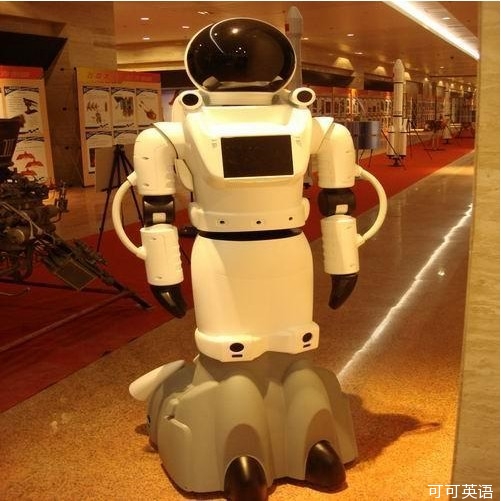(单词翻译:单击)

Science and Technology Monitor Caught in a BEAR hug
科技 观察家 落入BEAR怀抱
Robotics: A newly designed robot can recover casualties from battlefields, and might also be able to make itself useful to soldiers in other ways
机器人技术:一种新型机器人能够从战场上救回伤员,或许还能以其他方式为士兵服务
KILLING a soldier removes one enemy from the fray. Wounding him removes three: the victim and the two who have to carry him from the battlefield. T
杀一名士兵会使冲突中减少一个敌人,而伤一名士兵却会减少三个敌人:伤兵及运送伤兵撤离战场的两名士兵。
hat cynical calculation lies behind the design of many weapons that are intended to incapacitate rather than annihilate.
许多武器在设计时就运用了这种乖张的算计思维,它们的目的不是消灭敌人而是使敌人丧失作战能力。
But robotics may change the equation.
不过,机器人技术或许能改变这种格局。
The Battlefield Extraction-Assist Robot, or BEAR for short, is, in the words of Gary Gilbert of the United States Army's Telemedicine and Advanced Technology Research Centre (TATRC),
在美国陆军远程医疗与先进技术研究中心(TATRC)工作的加里?吉尔伯特(Gary Gilbert)说:战场协助撤离机器人(Battlefield Extraction-Assist Robot,简称BEAR)是
"a highly agile and powerful mobile robot capable of lifting and carrying a combat casualty from a hazardous area across uneven terrain".
"一种极其敏捷且功能强大的移动式机器人,它能够抱起并运送战场上的伤员,穿越崎岖不平的地带将其带离险境。"
When it is not saving lives, it can perform difficult and repetitive tasks, such as loading and unloading ammunition.
不在战场上拯救生命时,它还可以执行棘手及重复单调的任务,如装缷弹药。
The current prototype BEAR is a small, tracked vehicle with two hydraulic arms and a set of video cameras that provide a view of its surroundings to its operator via a wireless link.
现在这款BEAR的原型是一种小型的履带车,具有两个液压臂和一组摄像机,可以将其周围环境的图像以无线链接方式传送给它的操作者,
It has been developed by TATRC in collaboration with Vecna Technologies, a company based in Maryland that invented the robot.
它由TATR与Vecna Technologies公司合作开发,该公司位于马里兰州,首款BEAR就是该公司发明的。
Daniel Theobald, BEAR's inventor and Vecna's boss, says versatility is at the heart of the robot's design.
BEAR的发明者兼Vecna老板丹尼尔?西奥博尔德(Daniel Theobald)说多功能性是该机器人的设计核心。
"It would be completely impractical if you had robots with a sole duty to rescue soldiers, because they would spend most of their time unused," he says.
"如果只让机器人执行拯救士兵这一种任务,那太不实用了,因为它们大部分时间都将处于无用状态,"他说,
"The whole idea from the start was to design a general-purpose robot."
"从一开始,整个设计理念就是设计出一种多用途机器人。"
The BEAR's operator can control the robot in two ways.
BEAR的操作者可以通过两种方式控制机器人。
One, a joystick, can be embedded into the grip of a rifle and manoeuvred by the soldier's fingertip when he is holding his weapon to his shoulder.
一种是操纵杆,它可以嵌入步枪的枪把中,当士兵将步枪扛在肩上时,可以用指尖操纵此操纵杆。
The advantage of this is that he does not need to put his gun down to rescue his comrades.
这样设计的好处是士兵无需丢下枪就可以救他的战友。
The other means of control, a special glove designed by AnthroTronix, another Maryland firm, can sense the wearer's hand movements and direct the BEAR accordingly.
另一种控制方式是使用马里兰州另外一家公司AnthroTronix设计的专用手套。该手套可以感知佩带者的手部运动,以此指挥BEAR做相应的运动。
If, for example, the gloved hand moves to the left, the robot will follow.
举例来说,如果戴着手套的手向左移动,机器人也会跟着向左移动。
If the hand moves backwards, the robot will slow down or stop.
如果戴着手套的手向后移动,机器人就会降低移动速度或者停止移动。
If the glove's wearer closes his fist, the robot takes that as an instruction to grip an object with its arms.
如果带手套的人握紧拳头,机器人就会认为该指令是让它用手臂抓住某个物体。
Over the past year BEAR has been tested at the army's Infantry Centre Manoeuvre Battle Laboratory in Fort Benning, Georgia. It has shown that it can travel at around 12mph (19kph) across a flat surface.
过去一年里,BEAR在位于佐治亚州本宁堡的陆军步兵中心机动作战实验室里接受测试,结果显示它能以每小时12英里(即每小时19公里)左右的速度通过平坦路面。
It can also move over soil, sand and gravel, through trees and inside buildings, albeit at lower speeds.
此外,它还能在泥地、沙地和砾石路面上移动,能穿越树林及建筑物内部,尽管速度要低一些。
Several more years of tests are planned (this is the army, after all), but Dr Gilbert is optimistic that BEAR will come through them.
按计划,BEAR还要再接受几年的测试(毕竟这是在部队),不过吉尔伯特博士非常乐观,他相信BEAR能通过所有测试。
If it does, soldiers will be able to get on with their primary job of killing the enemy, without having to worry so much about what the enemy has done to their friends.
如果事实果真如此,士兵们就能够专心执行杀敌这个首要任务,而无需太担心敌人对他们的战友下了什么毒手。


